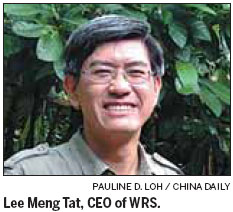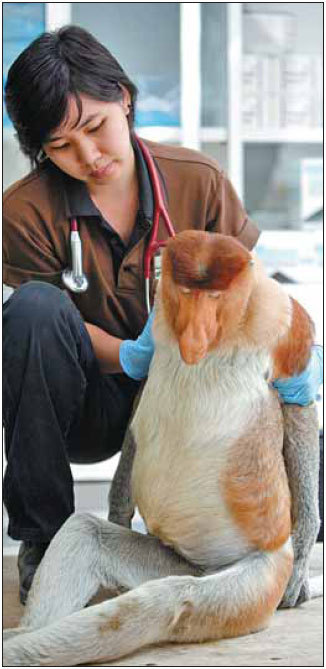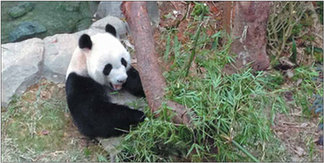Singapore's wild success
Updated: 2013-11-24 07:44
(China Daily)
|
|||||||
Experts share the country's secret to success in effective zoo management. Jaime Koh in Singapore looks at best practices.
Despite its urban and compact settings, Singapore is home to four wildlife parks - the Singapore Zoo, Jurong Bird Park, Night Safari and the recently opened River Safari - that are must-visits for many locals and tourists alike.
These parks and their conservation programs are considered some of the most successful in the region, if not the world.
Wildlife Reserves Singapore - the holding company of the four wildlife parks - has, over the years, successfully bred highly endangered orangutans, proboscis monkeys, lion-tailed macaques and Malaysian tapirs. This year, it's focusing on 18 species, including the pangolin, Asian elephant, Southern River terrapin, Bali mynah and oriental pied hornbill.
While conservation breeding remains a main part of the work, WRS also focuses on education and research, CEO Lee Meng Tat says.
One of the Singapore Zoo's outstanding features, for instance, is its open display concept, where the animals live in naturalistic settings.
The man credited for this is WRS' former CEO, Bernard Harrison. Known as the "zoo man" of Singapore, Harrison left WRS in 2002 in what the self-described "rebel at heart" says was a hard decision.
"I couldn't get on with my boss, so I ruminated for six months and then decided to leave I had never done any other job in my life, and I was a little scared that things may not work out," Harrison recalls.
He now runs his own zoo design company, Bernard Harrison and Friends, with jobs all over the world, including China.
Harrison is candid about the success of WRS during his leadership and after.
"WRS is doing very well for itself, and I believe I had developed and left a great team who could work with me - but, more importantly, could work without me," he says.

WRS has since undergone what Harrison called a "highly commercial phase" under a chairman who "turned the finances around and churned profit". But it was also under his term that the WRS parks became too expensive for average Singaporeans to visit and to eat at.
WRS is now under the chairmanship of Claire Chang from the Banyan Tree Group.
"Her approach is less commercial although she is from a very commercial background, and I am glad that she has brought more concern for conservation and set up the Wildlife Reserves Singapore Conservation Fund.
"She also developed MOUs (Memorandums of Understanding) with the Wildlife Conservation Society of New York, USA, and the Central Zoo Authority of India. I hope she will focus on making the zoo more affordable for the local families," Harrison says.
"Unlike most zoos in the world, which receive some form of financial support from the government, WRS is a wholly self-funded organization," Lee says. "Our primary sources of revenue come from ticketing and food and beverage offerings across the four parks. The majority of this revenue is ploughed back into our conservation and research programs."
Over the years, in tandem with its conservation and research program, WRS also beefed up its outreach and education for schoolchildren and to raise awareness about particular species.
This month, for instance, the Jurong Bird Park will host the Native Birds Festival to cultivate appreciation for birds endemic to Singapore and, more importantly, to discourage poaching, Lee says.
Can China, which has some success in certain conservation programs, such as those protecting pandas and Pere David's deer (milu), raise the bar and be just as successful? Harrison, who works with several Chinese cities to develop attractions, is confident the time will come.
"The population of China is maturing as the country becomes more economically stable," he says. "I believe there is a growing and maturing middle class who is much more environmentally aware and concerned than the last generation I knew in the 1980s, when I first started visiting China.
"These people are your future, for with environmental awareness comes concern and action. I saw a generation of Singaporeans grow up, unconcerned and uneducated in the need to protect and conserve the environment. We saw them in our zoos, abusing the animals, throwing stones at the crocodiles, and we took them to court for animal abuse."
That would be unthinkable today, Harrison says.
"Now they are the vigilantes and custodians of our wildlife both in the zoo and in the wild," he explains.
"I think China's mindset about conservation in zoos is changing as the new generation slowly takes over the helm of running its zoo. It will take time. But the change will come."
Contact the writer at sundayed@chinadaily.com.cn.
|
A vet holds Julau, a 9-year-old male Proboscis monkey, after the primate was sedated for a routine health inspection in the Singapore Zoo's operating room. Joel Boh / Reuters |
|
Kai Kai, the male panda from China, enjoys his special bamboo garden at the Singapore Zoo. He arrived at the zoo with female panda Jia Jia last year. Pauline D. Loh / China Daily |
(China Daily 11/24/2013 page3)

